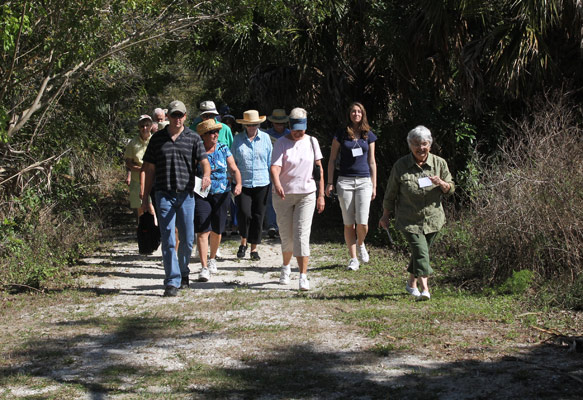
SEBASTIAN – Tucked into the corner of the North County Aquatics Center property sits a building that looks to be a hundred years old – but looks can be deceiving.
Built in the early 2000s, the Kitching Switch building is a replica of a typical “car shed” once used along the railroad that connected Sebastian to Fellsmere in the days when northern and midwestern farmers uprooted their families for the promise of year-round farming. About two dozen history buffs gathered inside the shed to hear the Indian River County Historical Society tell tales of the Kitching Switch and the “Little Dinky” that transported people between the towns.
“I just find it so fascinating,” said Joanna Salina, a 20-year resident of Vero Beach who said she respects and appreciates the work of the historical group to preserve the area’s heritage.
“I didn’t know anything about the railroad,” she said – it was all new to her.
The railroad no longer runs between the two cities, and the tracks, too, are no longer there – but a trail along historic railroad grade is being restored.
That trail, on which visitors got to walk a portion, is expected to eventually be improved to allow for walkers, cyclists and others to travel as part of the Rails to Trails program.
The railroad – once called the “Dinky Railroad” – was given a more grand name – the “Trans-Florida Railroad,” which was to have crossed Florida, connecting Sebastian and Fellsmere to Tampa. The Great Depression derailed the train project.
The Kitching family, from Sebastian, set up a general store along the Dinky railroad to serve the cattlemen and lumber industries working in the area.
“This is how Kitching Switch got its name,” county historian Ruth Stanbridge told the audience.
A settlement grew up around the general store and eventually a school, too, was built – called Eureka. A fire, however, destroyed the school and scattered the children to schools in Fellsmere and Sebastian.
The whole area surrounding the switch and the North County Aquatics Center is a part of what is now the Buffer Preserve, which has “a history all its own,” Stanbridge said.
The Dinky railroad ended at the north end of N. Broadway Street in Fellsmere, near the newly restored Fellsmere Inn, where newcomers to town once stayed while scouting out prime farming land.
A fellow visitor to the Telling Tales program by the historical society, Bill Harp said he enjoyed hearing again the tales of Kitching Switch and the surrounding area, noting that his family has been in the area for several generations, dating back to 1909.
He chronicled his family’s journeys in a historical novel called, “Lydia,” which has just been published.
“We’re having a good time,” he said of he and his wife, Kathy.
The Kitching Switch Tour was the second-to-last in the Telling Tales series from the Indian River County Historical Society.
The series wraps up in March with the Bunkhouse Breakfast and Cowpens Tour at the Sexton cattle ranch. For more information about the event, call (772) 778-3435.






